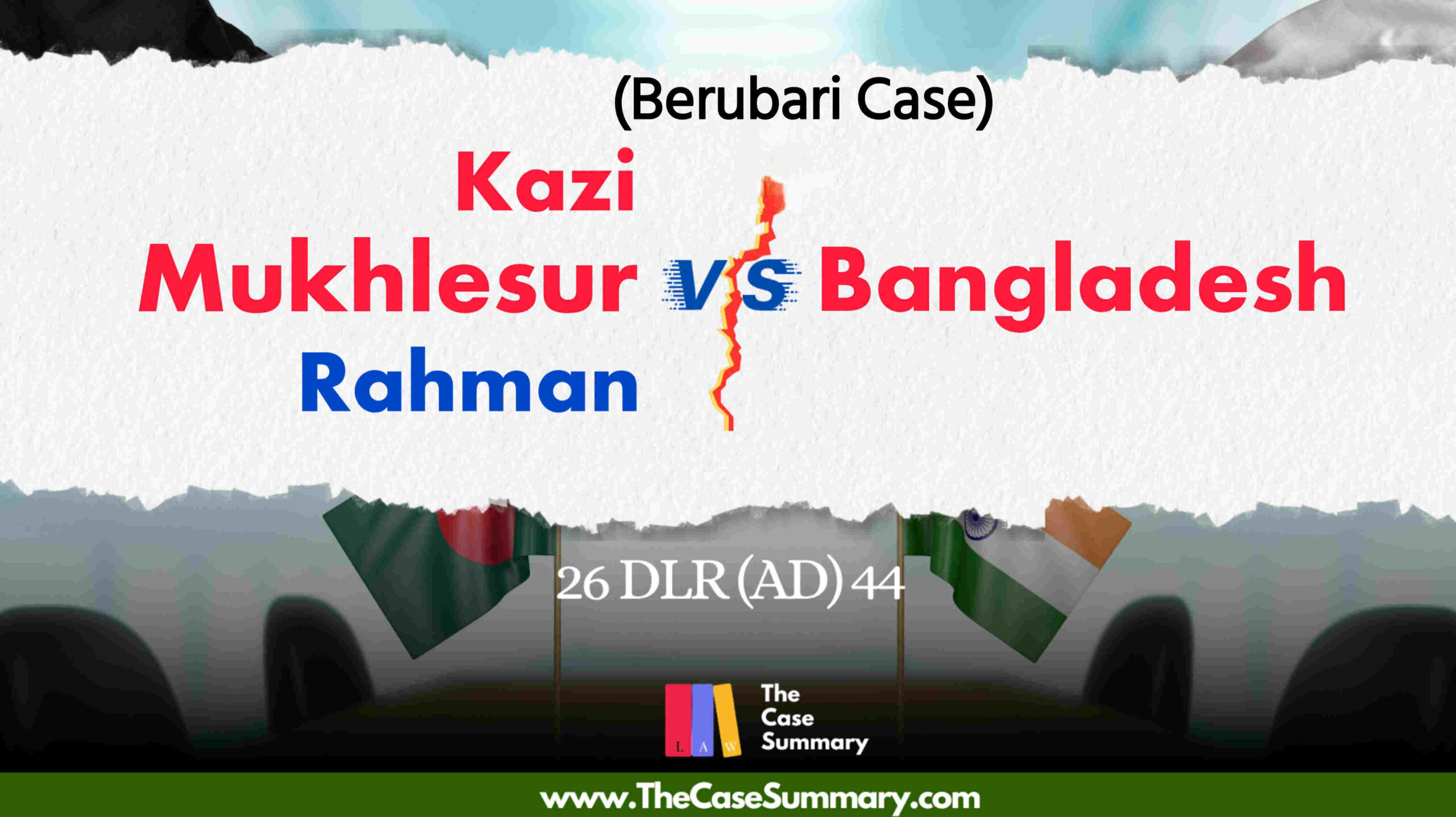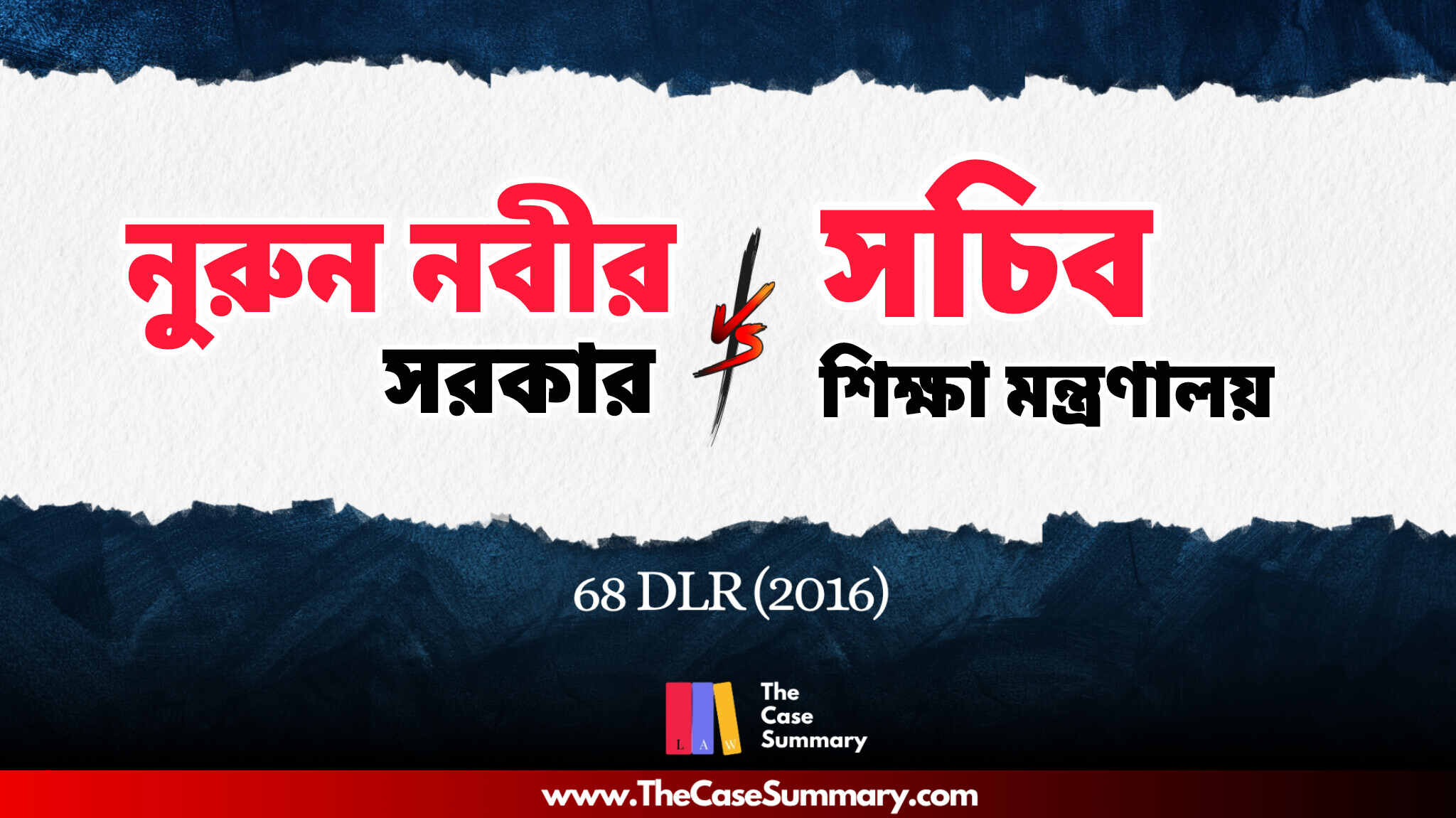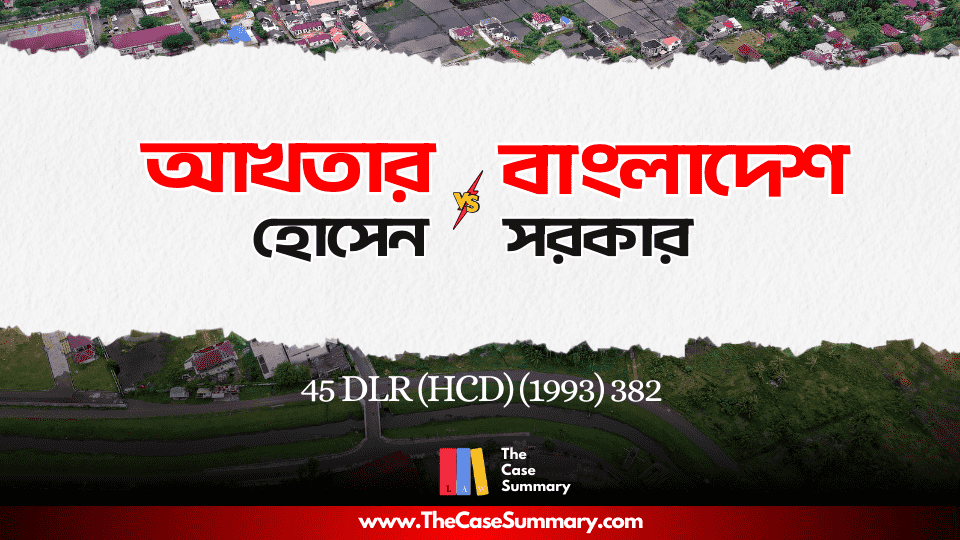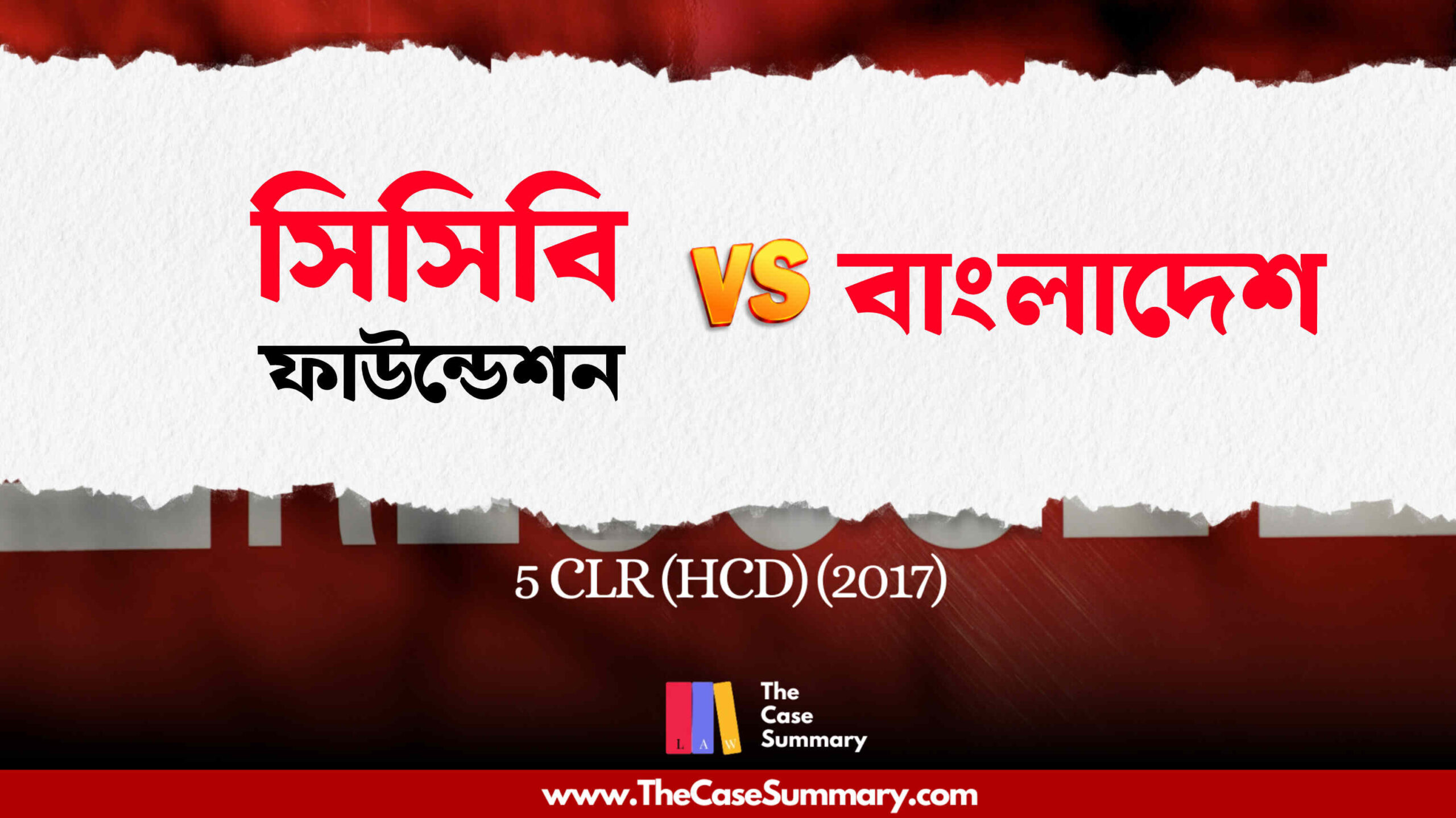Kazi Mukhlesur Rahman vs Bangladesh & another
Citation : 26 DLR (AD) 44
Jurisdiction : Bangladesh
Appellant : Kazi Mukhlesur Rahman
Respondent : Government of the People’s Republic of Bangladesh
Historical Background :
The main point of the contest was around Berubari in the Jalpaiguri district of West Bengal, also known as Berubari Union No. 12, with an area of 8.75 square miles. In 1947 British rule ended in the Indian subcontinent creating India and Pakistan. The Bengal province was also divided into East Pakistan (East Bengal) and West Bengal (in India). The Bengal Boundary Commission was formed, headed by Cyril John Radcliffe. This commission demarcated the boundaries of East Pakistan and West Bengal. This commission prepared the Radcliffe Award which showed the southern part (2.64 square miles) of Berubari Union No. 12 as the territory of East Pakistan. But later it was discovered that the entire Berubari Union No. 12 was included in West Bengal, India. The Pakistani government did not object to this matter.
It was discovered that 111 enclaves of India remained in East Pakistan and 51 enclaves of East Pakistan remained in West Bengal. On May 4, 1948, the ‘Inter Dominion Conference, 1948’ was held in Delhi where a recommendation was made to form a committee for resolving the border disputes between the two nations. On December 14, 1948, this committee recommended the formation of a tribunal for the settlement of boundary disputes. Subsequently, the ‘Indo-Pakistan Boundary Disputes Tribunal’ was formed. During the proceedings of the tribunal, no objection was raised by either two countries regarding Berubari Union no. 12. This tribunal provided an Award in 1950.
Two years later Pakistan raised objections about Berubari Union No. 12. Pakistan claimed that according to the Radcliffe Award, the southern part (2.64 square miles) of Berubari Union No. 12 was East Pakistani territory which was later mistakenly considered as Indian territory. Later, the prime ministers of the two nations signed an agreement in 1958 according to which, “The southern part (2.64 square miles) of ‘Berubari Union No. 12 would be given to Pakistan, all enclaves of Pakistan inside India would be owned by India, and Pakistan would get all enclaves of India inside Pakistan.” But the West Bengal government strongly protested against the decision to cede any part of Berubari Union No. 12 to Pakistan. For this reason, according to Article 143(1) of the Constitution of India, this agreement was sent to the Supreme Court of India for legal opinion, which is known as the Berubari Union Case, 1960. Subsequently, the Supreme Court of India came to the decision that “There are many ambiguities in the Radcliffe award regarding Berubari with another things and it has no opportunity to say that this agreement was made as per the award regarding Berubari”. So, the court considered the entire Berubari as ‘Indian territory’ and said this agreement was tantamount to the ‘surrender of Indian territory to a foreign country’. Later, according to Article 1(3)(c) and Article 3 of the Indian Constitution, the Supreme Court of India stated, “Parliament has to make law to execute this agreement. Besides, this agreement cannot be executed only by making a law under Article 3 of the Indian Constitution rather according to Article 368, Article 3 of the Constitution has to be amended. Then, this agreement can be executed by making law under Article 3 of the Indian Constitution.” After the decision of the Indian Supreme Court, the government of India provided the legal validity of this agreement by amending Articles 1 and 3 of the Constitution of India through the 9th Amendment in 1960.
Later, due to conflict between the two countries, the ‘Indo-Pak War’ broke out in 1965. Consequently, the southern part of Berubari Union No. 12 was not delivered to ‘East Pakistan’ and the enclaves were not exchanged. After the Indo-Pak war of 1965, the War of Independence of Bangladesh started in 1971. Consequently, East Pakistan was separated from Pakistan and the People’s Republic of Bangladesh emerged as an independent state. Thus, Bangladesh inherited the dispute over enclaves including the southern Berubari Union No. 12. On May 16, 1974, the Mujib-Indira Agreement was signed between the prime ministers of Bangladesh and India regarding the Berubari Union, enclaves and other boundaries.
Facts :
The Mujib-Indira Agreement stated –
“India will retain the southern half of south Berubari Union No. 12 and the adjacent enclaves, measuring an area of 2.64 square miles approximately, and in exchange, Bangladesh will retain the Dahagram and Angarpota enclaves. India will lease in perpetuity to Bangladesh an area of 178 meters × 85 meters near ‘Tin Bigha’ to connect Dahagram with Panbari Mouza (PS Patgram) of Bangladesh”.
Regarding enclaves, the agreement stated-
“All enclaves of India inside in Bangladesh and all enclaves of Bangladesh inside in India shall be exchanged as soon as possible.”
Later, an advocate of the Supreme Court of Bangladesh Kazi Mukhlesur Rahman filed a writ petition (writ petition no.-559/1974) under Article 102(2)(a)(ⅱ) of the Constitution of Bangladesh against this agreement in the High Court Division which is known as ‘Writ of Certiorari’.
Article 102(2)(a)(ⅱ) states-
“(2) The High Court Division may, if satisfied that no other equally efficacious remedy is provided by law –
(a) on the application of any person aggrieved, make an order-
(ii) declaring that any act done or proceeding taken by a person performing functions in connection with the affairs of the Republic or of a local authority, has been done or taken without lawful authority and is of no legal effect;”
Kazi Mukhlesur Rahman argued that this agreement affected Article 2(a) of the Constitution which states- “2. The territory of the Republic shall comprise –
the territories which immediately before the Proclamation of Independence on the 26th day of March, 1971 constituted East Pakistan;”
Kazi Mukhlesur Rahman argued that, since the area of 2.64 square miles in the southern part of ‘Berubari Union No. 12’ was a part of ‘East Pakistan’ according to the agreement of 1958. So, this area should be included as a part of the territory of Bangladesh according to Article 2(a) of the Bangladeshi Constitution. Thus, the delivery of this land to India would be unconstitutional. So, he requested the Court to declare that this agreement had been done without lawful authority and was of no legal effect. But the High Court Division summarily dismissed the writ petition remarking it as “premature”.
In this matter, the agreement of 1958 did not include any condition but an additional condition was added to the Mujib-Indira agreement which stated-
“This agreement shall be subject to ratification by the Government of Bangladesh and India and Instruments of Ratification shall be exchanged as early as possible. This agreement shall take effect from the date of the exchange of the Instruments of Ratification.”
The writ petition was filed only after signing this agreement. But this agreement included the condition of approval of the governments of the two countries for executing this agreement which meant that this agreement had not been executed yet. Based on this condition, the High Court Division stated-
“This agreement has not yet been completed, so there is no scope to say that this agreement is valid or invalid”
Based on this comment, the petition was summarily dismissed. However, the High Court Division issued a certificate* to Kazi Mukhlesur Rahman under Article 103(2)(a) of the constitution, stating, “An important interpretation of the article of the constitution is involved in this case.” Accordingly, Kazi Mukhlesur Rahman filed an appeal (Civil Appeal No.23/1974) in the Appellate Division against the Judgement of the High Court Division.
*[It is mentioned here that if the High Court Division provides a certificate stating that the case involves a substantial question of law regarding the interpretation of the Constitution, an appeal can be filed as of right against the decision of the High Court Division. However, if the High Court Division does not provide such a certificate, leave to appeal must be sought.]
Issues :
1. Was the certificate issued by the High Court Division, correct?
2. Did Kazi Mukhlesur Rahman have ‘Locus Standi’?
3. Was the Mujib-Indira Agreement under the jurisdiction of Judicial Review?
4. Was the writ petition of Kazi Mukhlesur Rahman “premature”?
Arguments :
The first objection raised by the respondent was that the certificate issued by the High Court Division was a “Defective Certificate”. The respondent argued that if the High Court Division granted a certificate under Article 103(2)(a) by mentioning that an important interpretation of the Articles of the Constitution was involved in this case, then the High Court Division should have specified which Articles of the Constitution were involved. Failure to do so would make the certificate a “Defective Certificate.” In support of his statement, the respondent had presented the following Indian and Pakistani cases-
1. Banarasi Prashad v Kashi Krishna Narain, (L R. 28 Indian Appeals 11)
2. Radha Krishan Das v Rai Krishan Chand (L R. 28 Indian Appeals 182)
3. Radha Krishna Ayyar v Swaminatha Ayyar (L R. 48 Indian Appeals 31)
4. Member Board of Revenue v Akhtar Khan (P.L.D. 1968 S C 270)
5. Sashi Bhusan v Asghar Ali [20 D.L.R (S.C.) 217]
The key point of these cases is that if an important interpretation of the Constitution is involved in any case, the court will not merely discharge its duty by granting a certificate. Rather the court will specify which Articles of the Constitution are involved in the interpretation. By mentioning these cases, the respondent claimed that since this certificate is defective, this appeal is considered incompetent for hearing in the Appellate Division. So, this appeal should be dismissed.
The Appellate Division agreed with the respondent and said,
“This certificate issued by the High Court Division is a defective certificate because the High Court Division did not specify which Articles of the Constitution are involved for interpretation.”
However, the Appellate Division said that even so, this case would not be incompetent to be heard by the Appellate Division because many important questions regarding the Constitution are involved in this case.
The second objection raised by the respondent was about the jurisdiction of the writ petition which is popularly known as “Locus Standi”. Kazi Mukhlesur Rahman filed a writ petition under Article 102(2)(a)(ⅱ) of the Constitution which stated-
“(a) on the application of any person aggrieved, make an order-
(ii) declaring that any act done or proceeding taken by a person performing functions in connection with the affairs of the Republic or of a local authority, has been done or taken without lawful authority and is of no legal effect;”
The respondent said, “Kazi Mukhlesur Rahman is not a resident of any area under the Mujib-Indira Agreement, so there is no opportunity to say that he is an ‘aggrieved person’.” The respondent further added, “According to Article 102(2)(a)(ⅱ) of the Constitution, only on the application of any aggrieved person, the court may give any order. Since Kazi Mukhlesur Rahman is not an ‘aggrieved person’, so he has no jurisdiction to file an appeal.” So, the respondent argued that this appeal should be dismissed. On the other hand, Kazi Mukhlesur Rahman said, “Since the jurisdiction conferred by Article 102(2) of the Constitution is considered as a discretionary power of the Court, so the words ‘any person aggrieved’ should be interpreted liberally and given a wide meaning.” He also said that his appeal has a special feature, as the Mujib-Indira Agreement violated his right to freedom of movement throughout Bangladesh, and his right to reside and settle in any place which is given in Article 36 of the Constitution.” Besides, he mentioned that many important questions regarding the Constitution were involved in his appeal.
In this regard, the Appellate Division said,
“The matter of ‘locus standi’ is an entirely discretionary power of the Court which is determined by the Court considering the facts and circumstances of each case.” The Appellate Division also said, “Although the appellant is not a resident of South Berubari Union No. 12 or adjacent enclaves under the Mujib-Indira Agreement, the Court consider that Kazi Mukhlesur Rahman has a ‘Locus Standi’ for only 2 reasons-
1. As a result of this agreement, an apprehension is created of Kazi Mukhlesur Rahman which is violation of right to freedom of movement throughout Bangladesh, right to reside and settle in any place and these types of rights are not the local rights of a citizen rather these rights extend to every inch of the territory of Bangladesh stretching up to the continental shelf.
2. An important question of the Articles of the Constitution is involved in this agreement.”
The third objection raised by the respondent was that the execution of any agreement is considered an ‘Act of State’. Thus, this agreement was not under the jurisdiction of ‘Judicial Review’.
The Appellate Division said,
“Deprivation of rights and freedoms of a citizen in the peace time cannot be considered as an ‘Act of State’ and the Court has jurisdiction to intervene in this matter. The excuse of ‘Act of State’ can’t suppress the intervention power of the Court in this matter when rights and freedom of a citizen are infringed.”
The fourth and final objection of the respondent was that this agreement had not been executed. So, this appeal should be considered ‘premature’ and it had no opportunity to say this agreement is valid or invalid.
The Appellate Division agreed with the respondent, stating,
“Since this agreement shall come into force after the delivery of the instruments regarding agreement, so this agreement cannot be treated as an ‘Executed Agreement’. Rather this agreement is a ‘Dispositive In Nature’ and according to Article 102(2)(a)(ⅱ) of the Constitution, there is no scope of the Court to declare the cancellation of this agreement on the ground that ‘This agreement has been done without lawful authority and is of no legal effect’.”
Decisions :
The Appellate Division dismissed the appeal based on the respondent’s fourth and final objection. However, the Appellate Division reviewed Articles 55(2), 142, 143(2) of the constitution and stated,
“Although the matter of entering into an agreement is vested in the executive branch of the state according to Article 55(2) of the Constitution but the matter of state boundaries is involved in this agreement, so this agreement has to be enacted through making a law by the parliament under Article 143(2) of the constitution.”
Article 143(2) of the Constitution states-
“(2) Parliament may from time to time by law provide for the determination of the boundaries of the territory of Bangladesh and of the territorial waters and the continental shelf of Bangladesh.”
The Appellate Division also said,
“Cession of territory of the state is involved in this agreement, so according to Article 142 of the constitution, Article 2(a) has to be amended for effecting this agreement.”
Subsequent Development :
On November 28, 1974, the 3rd Amendment of the constitution was made due to this case. According to the 3rd Amendment, the Mujib-Indira Agreement has been given legal validity and Article 2(a) of the constitution has been amended.
Before the 3rd Amendment, Article 2(a) of the Constitution was –
“2. The territory of the Republic shall comprise –
the territories which immediately before the Proclamation of Independence on the 26th day of March, 1971 constituted East Pakistan”
After the 3rd amendment, now Article 2(a) of the Constitution is-
“2. The territory of the Republic shall comprise –
the territories which immediately before the Proclamation of Independence on the 26th day of March, 1971 constituted East Pakistan [and the territories referred to as included territories in the Constitution (Third Amendment) Act, 1974, but excluding the territories referred to as excluded territories in that Act; and]”
The matter of ‘Public Interest Litigation’(PIL) was opened for the first time in the legal system of Bangladesh through this case and later it was established precisely in Dr. Mohiuddin Farooque vs. Bangladesh and Others (1997).
After signing the Mujib-Indira Agreement, through the 3rd Amendment of the Constitution of Bangladesh in 1974 and finally the 100th Amendment of the Indian Constitution in 2015, 51 enclaves of Bangladesh inside India and 111 enclaves of India inside Bangladesh were exchanged after many years.
Relevant Laws :
- Indian Constitution
- Article : 1(3)(c), 3, 143(1), 368
- The Constitution of the People’s Republic of Bangladesh
- Article : 2(a), 36, 55(2), 102(2)(a)(ⅱ), 103(2)(a), 142, 143(2)
Author :
1. Fahim Ahmed
Note : The Case Summary is a platform by the law students, for the law students. We aim to summarize the facts and decisions of various important cases in both Bangla and English with utmost caution. However, this platform is in no way a replacement for going through the complete judgements by the law students and we discourage any learner from relying on case summaries alone. Thank you



